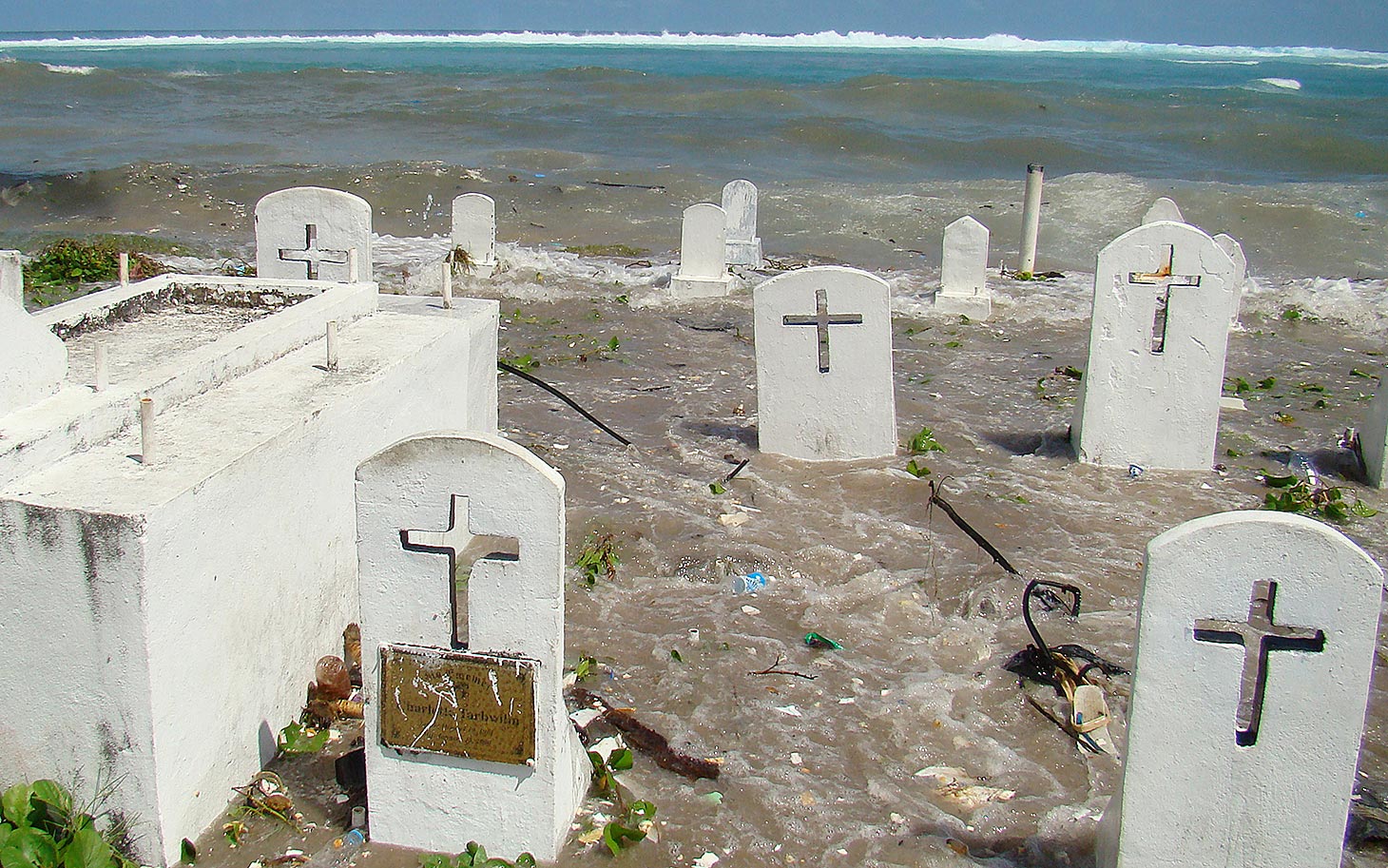
This is an invitation, an invitation to come to New York City. An invitation to anyone who'd like to prove to themselves, and to their children, that they give a damn about the biggest crisis our civilization has ever faced.
My guess is people will come by the tens of thousands, and it will be the largest demonstration yet of human resolve in the face of climate change. Sure, some of it will be exciting – who doesn't like the chance to march and sing and carry a clever sign through the canyons of Manhattan? But this is dead-serious business, a signal moment in the gathering fight of human beings to do something about global warming before it's too late to do anything but watch. You'll tell your grandchildren, assuming we win. So circle September 20 and 21 on your calendar, and then I'll explain.
Since Ban Ki-moon runs the United Nations, he's altogether aware that we're making no progress as a planet on slowing climate change. He presided over the collapse of global-climate talks at Copenhagen in 2009, and he knows the prospects are not much better for the "next Copenhagen" in Paris in December 2015. In order to spur those talks along, he's invited the world's leaders to New York in late September for a climate summit.
But the "world's leaders" haven't been leaders on climate change – at least not leaders enough. Like many of us, they've attended to the easy stuff, but they haven't set the world on a fundamentally new course. Barack Obama is the perfect example: Sure, he's imposed new mileage standards for cars, but he's also opened vast swaths of territory to oil drilling and coal mining, which will take us past Saudi Arabia and Russia as the world's biggest petro producer.
Like other world leaders, that is, he's tried, but not nearly hard enough. Consider what he told The New Yorker in an interview earlier this year: "At the end of the day, we're part of a long-running story. We just try to get our paragraph right." And "I think we are fortunate at the moment that we do not face a crisis of the scale and scope that Lincoln or FDR faced."
We do, though; we face a crisis as great as any president has ever encountered. Here's how his paragraph looks so far: Since he took office, summer sea ice in the Arctic has mostly disappeared, and at the South Pole, scientists in May made clear that the process of massive melt is now fully under way, with 10 feet of sea-level rise in the offing. Scientists have discovered the depth of changes in ocean chemistry: that seawater is 30 percent more acidic than just four decades ago, and it's already causing trouble for creatures at the bottom of the marine food chain.
America has weathered the hottest year in its history, 2012, which saw a drought so deep that the corn harvest largely failed. At the moment, one of the biggest states in Obama's union, California, is caught in a drought deeper than any time since Europeans arrived. Hell, a few blocks south of the U.N. buildings, Hurricane Sandy turned the Lower East Side of New York into a branch of the East River.
And that's just the United States. The world's scientists earlier this spring issued a 32-volume report explaining exactly how much worse it's going to get, which is, to summarize, a lot worse even than they'd thought before. It's not that the scientists are alarmists – it's that the science is alarming. Here's how one Princeton scientist summarized the situation for reporters: "We're all sitting ducks."
The gap between "We're all sitting ducks" and "We do not face a crisis" is the gap between halfhearted action and the all-out effort that might make a difference. It's the gap between changing light bulbs and changing the system that's powering our destruction.
In a rational world, no one would need to march. In a rational world, policymakers would have heeded scientists when they first sounded the alarm 25 years ago. But in this world, reason, having won the argument, has so far lost the fight. The fossil-fuel industry, by virtue of being perhaps the richest enterprise in human history, has been able to delay effective action, almost to the point where it's too late.
So in this case taking to the streets is very much necessary. It's not all that's necessary – a sprawling fossil-fuel resistance works on a hundred fronts around the world, from putting up solar panels to forcing colleges to divest their oil stocks to electioneering for truly green candidates. And it's true that marching doesn't always work: At the onset of the war in Iraq, millions marched, to no immediate avail.
But there are moments when it's been essential. This is how the Vietnam War was ended, and segregation too – or consider the nuclear-freeze campaign of the early 1980s, when half a million people gathered in New York's Central Park. The rally, and all the campaigning that led to it, set the mood for a planet – even, amazingly, in the Reagan era. By mid-decade, the conservative icon was proposing to Mikhail Gorbachev that they abolish nuclear weapons altogether.
The point is, sometimes you can grab the zeitgeist by the scruff of the neck and shake it a little. At the moment, the overwhelming sense around the world is nothing will happen in time. That's on the verge of becoming a self-fulfilling prophecy – indeed, as I've written in these pages, it's very clear that the fossil-fuel industry has five times as much carbon in its reserves as it would take to break the planet. On current trajectories, the industry will burn it, and governments will make only small whimpering noises about changing the speed at which it happens. A loud movement – one that gives our "leaders" permission to actually lead, and then scares them into doing so – is the only hope of upending that prophecy.
A loud movement is, of necessity, a big movement – and this fossil-fuel resistance draws from every corner of our society. It finds powerful leadership from the environmental-justice community, the poor people, often in communities of color, who have suffered most directly under the reign of fossil fuel. In this country they're survivors of Sandy and Katrina and the BP spill; they're the people whose kids troop off to kindergarten clutching asthma inhalers because they live next to oil refineries, and the people whose reservations become resource colonies. Overseas, they're the ones whose countries are simply disappearing.
Sometimes in the past, trade unionists have fought against environmentalists – but unions in health care, mass transit, higher education, domestic work and building services are all beginning to organize for September, fully aware that there are no jobs on a dead planet. Energy-sector unions see the jobs potential in massive solar installation and a "just transition" off fossil fuels. Here's a banner I know you'll see in the streets of New York: CLIMATE/JOBS. TWO CRISES, ONE SOLUTION.
There will be clergy and laypeople from synagogues and churches and mosques, now rising in record numbers to say, "If the Bible means anything, it means that we need to care for the world God gave us." And there will, of course, be scientists, saying, "What exactly don't you understand about what we've been telling you for a quarter-century?"
And students will arrive from around the country, because who knows better how to cope with long bus rides and sleeping on floors – and who knows better that their very futures are at stake? They're near the front of this battle right now, getting arrested at Harvard and at Washington University as they fight for fossil-fuel divestment, and shaking up the establishment enough that Stanford, with its $18.7 billion endowment, just agreed to get rid of its coal stocks. Don't worry about "kids today." Kids today know how to organize at least as well as kids in the Sixties.
And then there will be those of us plain old middle-class Americans who may still benefit from our lives of cheap fossil fuel, but who just can't stand to watch the world drift into chaos. We look around and see that the price of solar panels has fallen 90 percent in a few decades; we understand that it won't be easy to shift our economy off coal and gas and oil, but we know that it will be easier than coping with temperatures that no human has ever seen. We may have different proposed solutions – carbon taxes! tidal power! – but we know that none of them will happen unless we open up some space. That's our job: opening up space for change on the scale that physics requires. No more fine words, no more nifty websites. Hard deeds. Now.
You can watch the endgame of the fossil-fuel era with a certain amount of hope. The pieces are in place for real, swift, sudden change, not just slow and grinding linear shifts: If Germany on a sunny day can generate half its power from solar panels, and Texas makes a third of its electricity from wind, then you know technology isn't an impossible obstacle anymore. The pieces are in place, but the pieces won't move themselves. That's where movements come in. They're not subtle; they can't manage all the details of this transition. But they can build up pressure on the system, enough, with luck, to blow out those bags of money that are blocking progress with the force of Typhoon Haiyan on a Filipino hut. Because if our resistance fails, there will be ever-stronger typhoons. The moment to salvage something of the Holocene is passing fast. But it hasn't passed yet, which is why September is so important.
Day to day this resistance is rightly scattered, local and focused on the more mundane: installing a new zoning code, putting in a solar farm, persuading the church board to sell its BP stock. But sometimes it needs to come together and show the world how big it's gotten. That next great moment is late September in New York. See you there.
3 WAYS TO SHOW YOUR SUPPORT
- Log in to post comments














